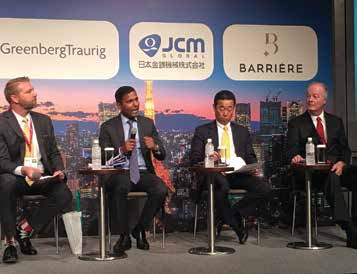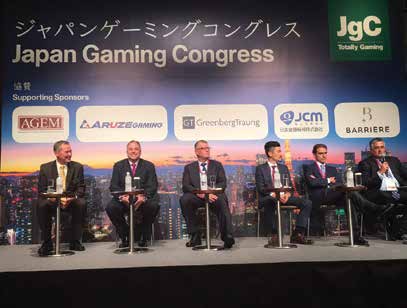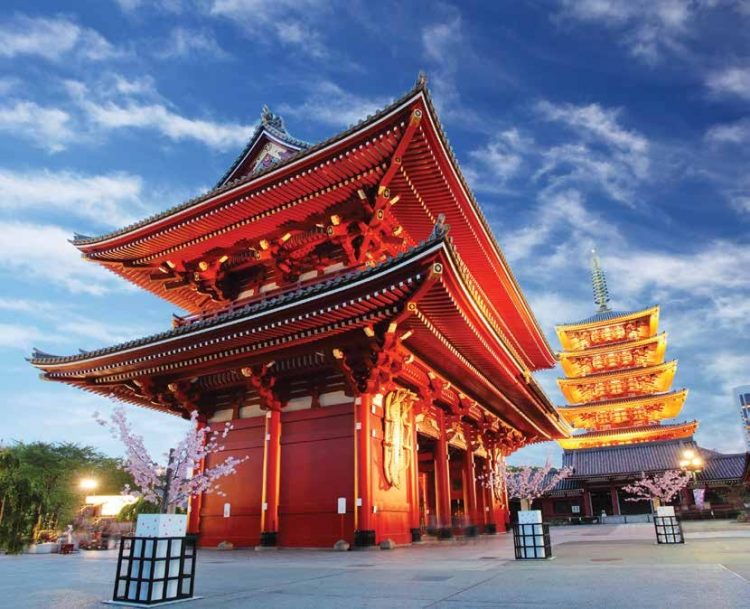The Japan Gaming Congress returned to Tokyo in May for the first time in three years with the biggest names in the industry coming together to discuss the key issues surrounding Asia’s next gaming hub.
It was 2014 when the Japan Gaming Congress (JgC) was held for the first time, but that inaugural event was merely a shadow of its 2017 reincarnation which returned to the Grand Hyatt in Tokyo from 10 to 12 May.
With the passing of the long-awaited IR Promotion Bill in December – the first major step in green lighting the casino industry in Japan – this year’s JgC attracted a massive audience of 420 attendees all looking to gain valuable insights or stake an early claim to a piece of the Japanese pie.
And it was a powerful assortment, too. From chairmen, presidents and C-level executives from the world’s biggest casino and integrated resort operators to local lawmakers and officials keen to learn more, the level of expertize on hand was indicative of just how much is at stake in this latest prospective jurisdiction.
They included the likes of Galaxy Entertainment Group President Michael Mecca, Marina Bay Sands CEO George Tanasijevich, Wynn Resorts President Matt Maddox, President of International Development at Caesars Entertainment Steve Tight, MGM Resorts Japan CEO and Representative Officer Ed Bowers and Sega Sammy President and COO Haruki Satomi, plus key government groups and attendees from the City and Prefectural Governments of Osaka, Hokkaido, Wakayama and Nagasaki.
Explaining the event’s importance, Mr Mecca said, “Doing business in Japan is a very special opportunity. Japan is very interested in developing the IR business in a very Japanese way. The resort itself has to be iconic to the city and prefecture of where we are doing business.
“In all of our conversations with the government and corporations their focus has been that they want the resorts to be incredibly special, they want them to represent Japan and the city and the prefecture where they are going to be built and they recognize that in order to do that there has got to be a significant investment.
“Certainly every IR company would like to be selected to be part of an IR in Japan.”
 The JgC saw a number of senior executives from renowned IR operators provide their visions for how an Integrated Resort in Japan might look, but also included in-depth discussion from local experts on key issues such as understanding Japan’s political environment, collaboration with local firms, licensing regulations and considerations, potential IR locations and problem gambling concerns.
The JgC saw a number of senior executives from renowned IR operators provide their visions for how an Integrated Resort in Japan might look, but also included in-depth discussion from local experts on key issues such as understanding Japan’s political environment, collaboration with local firms, licensing regulations and considerations, potential IR locations and problem gambling concerns.
Among the more notable revelations was the suggestion by Senior Manager and Sub-Leader for the Integrated Resort Support Office at Ernst and Young Japan, Masayo Watanabe, that the process for confirming a host prefecture may include that prefecture nominating the IR operator before any official decision by the national government was made.
“It may be that each local government will have to find their operator first,” he said. “There might be an RFP (request for proposal) process first with the local government finding an operator so that when the local government submits their application to the national government it includes an already selected operator.
“That way, when the national government selects where Japan’s IRs will be, they will be for areas with a known operator attached. The national government will know who the operator is.”
Takayoshi Koike, President & CEO of Capital & Innovation Inc, said the winning formula for a joint venture consortium in Japan would be one involving three parties – “a foreign operator with experience; large, well-financed national corporates who understand Japan; and local business leaders who understand the local area where the IR is going to be,” Mr Koike said.
The JgC also addressed a number of important concerns that will need to be taken into account before any Japanese IR becomes a reality.
Among them is the issue of IR locations, with Mr Hidetaka Saeki – an expert in Japanese government policy and Honorary Fellow, School of Government at Kyoto University & President of IRIS Research Institute – noting contradictions in the IR Promotion Bill.

“This law states that the purpose of the law is to foster local economies or promote tourism in local areas, but the definition of integrated resort contradicts that because they have to be so big,” Mr Saeki told IAG in an exclusive interview at JgC.
“If you look at somewhere like Wakayama Prefecture where the population and the economy is quite small, to maintain a huge facility like that is very difficult. They talk of conventions and amusement parks but even the Tokyo Disney resort is facing some difficulties which shows how difficult it is to maintain the amusement park to be profitable.
“MGM used to have a huge amusement park and they had to shut it down because it just doesn’t make money. The same thing can happen unless you locate this IR in the densely-populated areas such as Yokohama and Tokyo.
“These are the only areas where the so-called IRs can survive. “So, contrary to the purpose of this law to foster local economies with IRs, the basic IR model doesn’t fit that. It can only go somewhere that already has a big population.”
Any implementation of an IR industry in Japan would, it was explained, first require a widespread education campaign targeting a local population famously wary of problem gambling. However, it could also present a rare opportunity to improve best practice on a global scale.
As Scientific Games Managing Director for Asia, Ken Jolly, explained, “By the time casino doors open in Japan we could have even more advanced harm minimization functionalities such as tracking back to ID cards, enhanced information displays for players – even recommending voluntary exclusion could be done in the system.
“We are always developing new functionality. By the time we get there, data science will be a big thing. We will also see improved loyalty and business intelligence functions.
“Typically players have been rewarded in groups, but individual players could be identified and rewarded too. It could be tied into the host management system. Players could enter the casino and local Japanese hosts could immediately know.
“This could have good harm minimization outcomes – a local Japanese host could approach players as soon as they walk into the casino.”










-120x86.jpg)






















